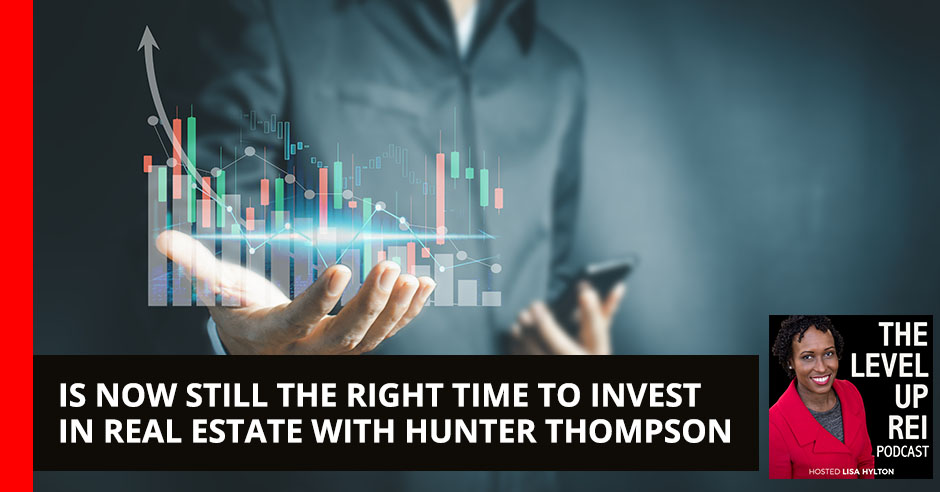
With the state of the economy today, is it still a good time to invest in real estate? With all this talk about inflation and the impending recession, should you invest? Join Lisa Hylton as she talks to Hunter Thompson about his thoughts on this topic. Hunter is a fulltime real estate investor, managing principal, and founder of Asym Capital. He has helped a lot of people acquire millions of dollars in real estate assets. Listen in to hear why he thinks investors should be fine despite all the talk.
—
Listen to the podcast here
Is Now Still The Right Time To Invest In Real Estate With Hunter Thompson
Welcome back to another episode of the show. I’m super excited to have Hunter Thompson on the show. Hunter Thompson is a full-time real estate investor and Founder of Asym Capital. Since founding Asym, Hunter has helped more than 400 retail investors acquire over $150 million in mobile home parks, self-storage, retail offices, ATM machines, and cryptocurrency assets. He’s the host of the Cash Flow Connections Real Estate Podcast, which has received over one million downloads. He also wrote the Raising Capital for Real Estate book, which hit number one on Amazon in real estate sales and selling. Welcome to the show. I’m happy to have you on.
It’s an honor to be on. I’ve seen you crush this game for so long. I’m so excited to be part of this awesome mountain of coolness that you’re building. Thanks for the opportunity.
I’m happy to have you. I know you’re a man that loves economics, data and all that good stuff. I want to jump right in and talk about the state of the economy. We have rising interest rates and inflation is out of control. I have lots of investors who are like, “I’m getting cold feet. I don’t know if I want to keep investing in real estate.” Can you start with the lay of the land in terms of what you’re seeing from your perspective and the approach you’re taking going forward as well?
I would be happy to. First of all, I like to think of the fact that we are investors in an economic world. As investors, we have to be focused on trends. That alone is important to understand. Which way are the winds blowing? We have to be cognizant of this thing because if not, you can make investments that make sense on a thesis-specific basis, but you’re playing in a world through economics. You’ve got to know both the thesis, the market, and the specifics of your particular niche. You also need to know the foundation on which you’re building this thesis which is economics.
To your point, there have been a lot of people asking this question. I interviewed 22 experts on economics in different niches. I will tell you about that in a second. Generally speaking, I will give you the rundown. The reason that this is coming up so clearly now is something that’s unique. It’s an economic phenomenon that I’m sure a lot of your audience is already aware of. It’s that the ten-year yield curve inverted the yields of short-term bonds and touched where they were higher than long-term bonds. That doesn’t make sense. What that means is that when we loan money, we would anticipate that the longer the duration, the rate that you would expect to receive would be higher because you’re incurring all this risk all the time between now and then.
A very common indicator of recessions is when the two year-yield is higher than the ten-year yield. It’s a very interesting phenomenon. There are a lot of people that now are like, “What does this mean? What’s going on? I should be focusing on economics.” There are a lot of other economic data points that we’re going to talk about in this episode that indicates that in the event that there is a recession, typically on average is 18 to 22 months after the inversion of the yield curve, I don’t think that there is a significant downside in real estate. At least not the real estate assets that I’m tracking, which are most notably mobile home parks, self-storage and multifamily apartments. I can give you a lot of data as far as why that’s the case, but that’s generally my thesis.
Right now, the 10-year yield curve inverted. The yields of short-term bonds touched where they were actually higher than long-term bonds. Share on XThere were a couple of things there. You noted that typically, 18 to 22 months after the inversion is when usually you’re going to see the onset of the recession. Some people might still be thinking, “They’re not sure whether it’s going to happen or not.” Could you talk about maybe some of the economic indicators along the way that is suggesting beyond the inverted yield curve that is continuing to reinforce that it is happening?
Generally speaking, I see a lot of very positive trends that are focused on real estate. I’m not going to come up here and claim that I can predict that there will or will not be a recession. We can use the probability of 80% to 90% that there will be a recession within the next two years. Two years is a long time, especially if inflation is turning at the rates that it’s turning out. Can I talk about inflation quickly?
Yeah.
A lot of people think that real estate is a great hedge against inflation. They’re right, but it is far more than that. Why are we talking about this? First of all, the Fed and other central banks all around the world have made it clear that if there is a significant correction or a potential for one, they’re going to smash the multi-trillion-dollar button.
In 2020 and also in 2008, but particularly in 2020, the moment that the fear started to grab the economy, the Federal government printed about $6 trillion, and global governments around the rest of the globe printed another $4 trillion. That’s a total of $10 trillion sloshing around the world economy looking for yield. What that does is first, a lot of that money goes into bonds and the flight to safety. It’s very easy to allocate trillions of dollars into bonds, which reduces interest rates because bond prices and interest rates have an inverted relationship. When that happens or when money floods into bonds, the yields go down and down, and then people start looking for other favorable risk-adjusted returns.
The United States real estate is incredibly well-positioned because as those trillion dollars are searching for yield, not only is the United States very well-positioned from a legal standpoint, there’s a crazy supply and demand imbalance of demand for affordable housing versus the actual affordable housing. When inflation happens, as a real estate investor and an owner of real estate, something interesting happens. Not only does the value of the asset increase. There are two other pieces. One is let’s assume that top-line revenue, after you’ve implemented the business plan, increases at the rate of inflation, and your expenses also increase at the rate of inflation.

Real Estate: As an investor, you have to be focused on trends. You have to be cognizant because if you’re not, you’ll make investments that on a thesis basis, but you’re playing in a world through economics.
Rental income should increase at 5% per year if inflation is 5% per year. Expenses should also increase it 5% per year. As real estate investors, we know there is not a 1:1 ratio between gross income and expenses. It’s not 50/50. If it was 50/50, it would be a net wash because everything is increasing at the same rate and it’s all the same. That’s not the case. Typically in multifamily apartments, you’re having 42% to 43% operating expense ratio. Also in self-storage, for example. It is a 30% to 35% operating expense ratio. You’re getting the better end of that deal every single year. There’s a delta between that growth. Does that make sense?
That does make sense.
That is powerful because then not only are asset prices increasing naturally because of inflation and the multiple is increasing, but the NOI itself is increasing every single year that inflation continues to increase. I don’t hear enough people talk about that. There’s another piece of this that almost no one talks about that is a holy-crap moment. Can I jump into that quickly?
What is that?
As real estate investors, typically, our deals are leveraged. Usually, people say 2:1 or 3:1. It means that we’re probably going to put down 30% of the purchase price and borrow 70% or maybe slightly more. As an example, if we’re buying a property that’s a $13 million property and we’re putting $3 million down and borrowing $10 million, the borrowed money and the purchasing power of that borrowed money is being eroded by inflation.
It means that for every dollar that we borrow, the longer we borrow it, the less it means from a purchasing power standpoint so much so that if inflation does continue at 7% and 8%, which would not only super inflate valuations and NOI because of what I talked about, the purchasing power of that $10 million would be reduced by half over a ten-year period. They are paying you to borrow money if interest rates are significantly below the rate of inflation. Now we’ve got the best of all worlds together. That’s just one piece of this economic situation that I’m excited about.
As a real estate investor, you should know that there is no one-to-one ratio of gross income and expenses. Share on XI have a question for you though about the impact of these economics on actual investments. I believe that we need to have conversations with investors regarding expectations on returns because properties cost more to buy due to inflation and higher interest rates. What are your thoughts there when you’re talking to investors now and going forward?
I interviewed 22 people. You can check it out. It’s a free summit. It’s called 100KToInvest.com. I’m very excited about it because these are the types of questions that people that have hundreds of millions of dollars in real estate are answering constantly. To your point, we’re talking about the right stuff. We need to be talking about setting expectations of future returns as opposed to talking to investors about waiting for this incredible correction that is not going to come.
What I’m seeing is a massive tailwind to real estate. It means that if you think cap rates are low now, just wait. If you think this opportunity in multifamily is super competitive, just wait. What will eventually happen if that’s the case? Return profiles will eventually come down and be more aligned with other tradable asset classes as the market becomes more institutionalized.
There have been a lot of talks about how in multifamily and other asset classes, more institutions are getting involved, but not in the types of deals that you and I like to pursue. They are not these $10 million, $20 million or even $30 million assets because if you’re BlackRock, to place $10 million is not worth your time. They will eventually start to meaningfully participate in this space. I want to be owning the assets and not trying to buy them at that time.
In terms of setting expectations, it is important to be able to achieve healthy returns for investors given what’s going on with inflationary environments. We still want to be able to purchase assets where from a sensitivity analysis, you could increase the cap rate on sale by about ten basis points per year. If you’re able to find a deal where you increase the cap rate upon purchase by ten basis points per year and sell at an exit cap based on that, or at least you are underwriting to do so and you can produce a healthy return, I’m starting to feel very comfortable, especially when you include the conversation that we were having about inflation, which I think the absolute opposite is going to happen.
Connected to that, the other thing that I want to speak on is the loans. With rising interest rates up until this point, largely a lot of operators have utilized bridges, flexible interest rates, purchasing caps, etc. What are your thoughts? I feel like we are stuck between hard places in terms of permanent loans versus large prepayment penalties versus bridge debt.

Real Estate: If inflation really does continue on 7 and 8%, then every dollar that you borrow will mean less the longer you borrow it from a purchasing power standpoint.
As some of you may know, I have a unique perspective on all of this because we are not an operator. We are an aggregator of relationships that we developed over the last several years. I’m willing to participate with different strategies, different niches, different risk profiles or different geographic locations based on relationships that I’m working with partners that I look up to and I believe are industry titans in their particular niche. What does that mean? I think a diversified approach is appropriate here. A combination of floating-rate debt and fixed-rate debt is appropriate.
When I started in this business in 2010, all the clamor was about winter interest rates going to rise back to “historical norms.” At the time, they thought it was 6%, 7% or 8%. If you invested based on that thesis, not only did you miss out on one of the best opportunities to invest in the history of the United States, you cost your investors money. You did a massive disservice to your investors.
Talking about only getting fixed-rate debt is one thing, but the moment you pay a seven-figure or multi-seven-figure prepayment penalty, that changes. You thought you were being conservative and the reality was perhaps you were misguided. The truth is I don’t know where interest rates are going to go. I was in a debate not long ago about this topic.
I was talking about how I thought they were going to go down into the right as they have over the past years, but the people that were disagreeing with me were some of the most well-educated and well-funded people in the space of real estate, including John Chang who is the Vice President of Educational Content over at Marcus & Millichap. He knows quite a bit about economics. The point is that people who are far smarter than me disagree, so I think a diversified approach is a good strategy.
There’s one important piece. What I don’t want investors to do is sit on the sidelines. My view on inflation is such that it’s going to deteriorate your return profile. Let’s say there is a recession in eighteen months and there is a very historic reduction in real estate prices. It happened in 2008 but that is not standard. Even if prices were to be reduced by 20% valuations, if you’re good at what you do, you should be able to produce more value than 20% into a two-year period. That’s the reality.
Look at any underwriting model out there. If you’re able to produce let’s say a 15% IRR, that’s going to double the value of the investor capital in five years. If that business plan is being implemented effectively, I want to go and find ways to do that. I’m going to put a bunch of caveats in this stuff later in this conversation.
It is important to be able to achieve healthy returns for investors while still being able to purchase assets from a sensitivity analysis. Share on XA couple of more things came to my mind. When you said something about achieving that 20%, etc., some of the things that I think about is playing in the value–add space, but then when you are presented with class A like A-minus deals that have very light value–add to be had on them, I feel like it’s very much capital preservation. Those deals are pretty much riding inflation and then eventually giving their investors back their money intact with inflationary returns. Those are my thoughts.
It’s fair enough. It’s mathematically not possible that the next ten years will be even remotely like the last ten years. When those deals were being purchased in 2012, operators were not underwriting 33% IRR. They were underwriting 12% and 13% IRR. They ended up producing 33% IRR. I don’t think that’s going to happen again.
We can’t have 300 basis points of cap rate compression going forward, but the point is putting yourself in a position to achieve 12%, 13% or 14% on a consistent basis where the predictability of outcome is high, I want to find those deals. Based on this conversation, it makes sense if I viewed this space just like what I outlined. All I would want to do is borrow money and buy things. That’s not at all what we do. It is more important than ever to have a massive strategic market-specific or investment-specific advantage over your competitors. I want to invest with groups that have that advantage.
I’ll give you one example. I don’t want to be super long-winded. You’ve heard people say, “We were bidding on a deal for $40 million and they got bought for $60 million.” You’re thinking, “That’s the end of the cycle. That’s the clear sign that this is over.” Another version of that is, “We wanted to go buy a deal. We tried to put $250,000 down non-refundable on day one. We got outbid by someone who put $1 million down non-refundable on day one. How can I possibly justify that?” Maybe your competitors are incompetent, but maybe they have some serious property-specific or market-specific advantage that you do not yet have access to for whatever reason.
Maybe they know everything there is to know about that property. They know the status of the roof or the chiller if there is one. They have a property management company that’s 1 mile away. They can move that property management company. They know the expense ratio of that property, same size, same budget. The likelihood of predictability of outcome is drastically increasing. I am not investing unless that type of market advantage exists because of the competition in the space.
That was going to be one of my questions because I know we’re getting to the top of the hour here. Connected to that is you mentioned diversification and this item here, which is that market advantage. As investors look to deploy capital, are there any other items that you think are beneficial or maybe even asset classes that you’re focused on even though widely diversified?

Real Estate: It is important, more than ever, to have a massive strategic, market specific, and investment specific advantage over your competitors.
I’m not trying to be inflammatory. I do believe this or at least it’s a question that needs to be asked. I was in a group of investors and they said, “What do you think are the most undervalued asset classes right now?” I said, “It might be multifamily.” It might be the case. On a risk-adjusted basis, that might be the most undervalued asset class in the United States.
One way that I would show that is that the all-time high cash reserves across multiple publicly traded private equity groups and non-publicly traded private equity groups are waiting for their opportunity to get into the space. Eventually, they’re going to recognize what I’m talking about, which is that they’re getting hammered by inflation. Once that money, which I’m talking about all-time highs, starts to get into the marketplace, it will most likely go to multifamilies as opposed to mobile home parks, which I’m also very bullish on.
Self-storage, given my view on inflation and the sense that it can be repriced every 30 days, is the same as mobile home parks. Multifamily is usually 9 months to 12 months. We’re very excited about a Bitcoin mining fund that we launched, which is exciting. It is anything recession-resistant, cashflow-focused, and some way that there’s some element where people are looking left when we want to go right. That does include multifamily from our perspective. The hesitancy that’s happening because of the question marks around the inverted yield curve might create the opportunity that a lot of us have been waiting for. It’s not necessarily in terms of prices but in terms of being able to transact.
My second item was about senior living. I know that’s a space that you’ve played heavily in the past. When you think about the trajectory for that space, what are your thoughts there?
I’m very bullish long term on senior living. I’ve had a lot of conversations with people that are exclusively in this space. The appetite for private equity for retail investors and lenders is completely going in one direction because of this demographic shift that we’re all very aware of. The challenge with that space that we’re all very aware of is the risks associated with COVID and the uncertainty around how it may play out, especially on a state-specific basis.
If we’re going to be buying new opportunities in that space, we’re going to be on markets like Texas, and Florida in particular because of the demographic shifts, and states that are less inclined to lockdown. Having said all that, you have to be cautious of the nature of the virus itself, which probably most of us agree is probably behind us. If it’s not, you need to be cautious about occupancy in senior living.
Going back to our conversation about operating expense ratios, you see operating expense ratios in the 70s in senior living. It doesn’t mean that they’re going to be on the losing side of this discussion around inflation. In fact, we have seen properties increase in the last couple of months in terms of rental income by 15%, 18%, or 20%. It has taken a property that’s a $3,500 a month property to a $5,200 a month property in part because of wage inflation. I’m excited about that opportunity in the space but certainly, there’s hesitancy there because of COVID.
Multifamily on a risk adjusted basis, might be the most undervalued asset class right now in the United States. Share on XLastly here, for someone that has consistently invested in multifamily and they have anywhere from $500,000 to $1 million to invest in commercial real estate properties here in 2022, they are reading this and they learn about the diversification that you mentioned earlier and that market advantage. They’re thinking, “How do I get comfortable with a new asset class all that other stuff.” What advice you would give to these investors as they think about branching out?
I do speak quite a lot. I want this to be exciting, entertaining and educational. I came here to make a strong case for my bullish outlook. I’m a very skeptical person and the reason I do a lot of interviews myself is that I want to learn and not everyone agrees with me. Having said all that, when it comes to money, I take this stuff very seriously. If you’re not 100% confident that if you wire someone $100,000 that you’re going to be able to sleep well, then wait and go all-in on education. That 7% inflation is nothing compared to the lack of emotional stability in your own life.
What I would say is get comfortable. Go all-in until you heard the same stories from the same people and the same thought leaders. You start seeing the matrix in terms of who is out there. As opposed to going all-in on everybody, I would find a couple of people that you feel resonate with you from a gut feel and personality standpoint. Go all-in on their available educational content. Don’t send anybody any money until you’re super comfortable. If you’re like, “I don’t know about Bitcoin mining,” don’t send the money. There are always great opportunities out there.
I’m here to talk about how this is interesting and exciting, and that’s because I spent many years building up my confidence network. I started my business in 2010 and everyone said, “This is a back the truck up moment.” I didn’t know what I was doing. By 2014, the deals I saw were better despite the market increase of more than 30% because my network, my knowledge, and my confidence grew at a rate that was faster than the most significant real estate correction and recovery in the history of the United States. There are always great opportunities. Go all-in on people or the personalities that you want to align with, and focus on education first.
If my audience wants to learn more about you, where’s the best place they can go to learn more?
There’s one place. I’m super excited about this summit. It’s free. Get the VIP upgrade. You’re going to get access to all the speakers. Go to 100KToInvest.com. I’m so excited. I will see you guys there.
Thank you. I appreciate it.
Important Links
- Asym Capital
- Cash Flow Connections Real Estate Podcast
- Raising Capital for Real Estate
- 100KToInvest.com
About Hunter Thompson
 Hunter is a full-time real estate investor, and founder of Asym Capital (“AY-SIM”). Since founding Asym, Hunter has helped more than 400 retail investors acquire over $150,000,000 of mobile home parks, self-storage, retail, office, ATM machines, and cryptocurrency assets.
Hunter is a full-time real estate investor, and founder of Asym Capital (“AY-SIM”). Since founding Asym, Hunter has helped more than 400 retail investors acquire over $150,000,000 of mobile home parks, self-storage, retail, office, ATM machines, and cryptocurrency assets.
Recent Comments